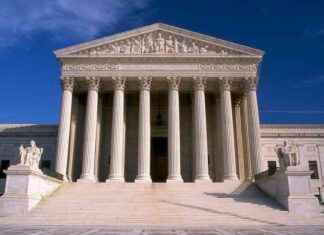Chauvin, a white man, was convicted of state murder and manslaughter for pinning Floyd’s knee against Floyd’s neck in a May 25, 2020 arrest. The Black man claimed he couldn’t breathe Chauvin was sentenced this spring to 22 1/2 years.
According to the federal charges, Chauvin denied Floyd his rights by kneeling down on Floyd’s neck while he was being handcuffed. He did not resist.
Chauvin was present Wednesday at the change of plea hearing. He wore an orange short-sleeve prison t-shirt and was led into the court in handcuffs. To confirm his pleas in Floyd’s death and another 2017 case, he said “Guilty your honor” and admitted that he was guilty.
Chauvin will serve approximately 15 years behind bars after he is released on parole and given the presumption of good conduct. The federal sentence will run concurrently with the state sentence. About 85 percent of federal sentences are presuming good conduct. This means that Chauvin would serve six years and three more months if the judge grants Chauvin the maximum 25-year sentence.
Judge Paul Magnuson did not set a date for sentencing.
Along with Chauvin, three other former officers were also indicted: Thomas Lane and J. Kueng. These charges are still being pursued, and they will be tried in the state court next year.
Floyd’s arrest, and subsequent death by police officers, was captured on cell phone video. This prompted mass protests across the country calling for justice for Blacks and ending racial inequality.
Chauvin pleaded guilty as part of the plea agreement to violating the rights a then-14 year-old boy during an arrest in 2017. He held the boy by his throat, hit him with a flashlight, and placed his knee on the boy’s neck while he was lying down.
According to a pool reporter, Floyd’s family was represented by several members, as well as the teenager involved in the 2017 arrest. Floyd’s brother Philonise told Chauvin, the 2017 victim, as they left courtroom: “It is a good day to justice.”
Chauvin was supported by nine people, including his family. According to the pool report, he waved and smiled at them while he entered the courtroom and exited it.
Floyd’s arrest, and subsequent death by police officers, was captured by a witness on cell phone video. This sparked nationwide protests calling for the end of racial inequalities and poor treatment of Black people by police.
Prosecutors must prove that a police officer committed a crime under the “color” of law, or government authority and that it willfully deprive someone of their constitutional rights in order to bring federal charges for deaths involving officers. This is a very high standard. Federal charges cannot be supported by an officer who is negligent, has bad judgement or was in an accident. Prosecutors must prove that the officer was aware of his error, but still did it.
According to the evidence in the state case against Chauvin Kueng and Lane assisted Floyd, 46 years old, while he was lying on the ground. Kueng placed his back on Floyd and Lane held Floyd’s legs down. During the 9 1/2 minute restraint Thao kept bystanders away and prevented them from intervening.
Federal court charged all four ex-officers with Floyd’s deprivation of rights, while they were acting under the government’s authority.
Chauvin was charged in 2017 with the deprivation of the boy (then 14 years old) of his right to be free from unreasonable force. He held the boy by the throat, hit the boy in the head with a flashlight, and placed his knee on his neck while he was lying down.
According to a 2017 police report, Chauvin stated that the teen refused to be arrested and that Chauvin used his body weight to “pin” the teen to the ground. Two stitches were required to stop the bleeding from the boy’s ears.
This was just one of many instances mentioned in state court filings. They claimed that Chauvin had used neck, head, and upper body restraints seven more times prior to 2014. Four times were state prosecutors claiming that Chauvin went overboard and used the restraints beyond what was necessary under the circumstances.
They are expected to face federal charges in January against the three other former officers, while they will be tried on state charges for aiding and abetting in March.










